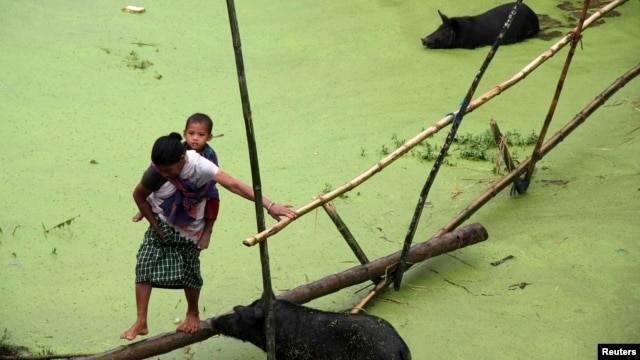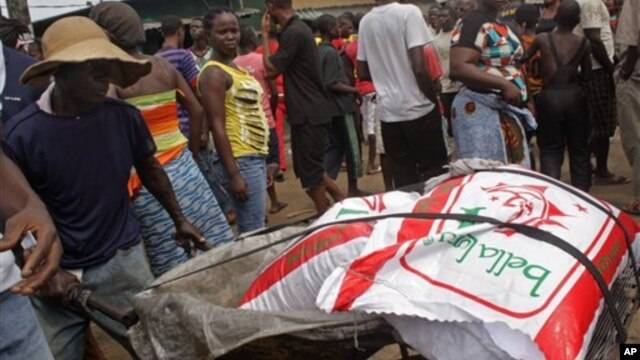Granny says its the end times - like St. John told us about what it says in Revelation inna Bible...
WHO: Climate Change Brings New Health Threats
August 27, 2014 — The World Health Organization (WHO) warned Wednesday that major killer diseases will spread and health problems will worsen with climate change.
See also:
Ebola Threatens Food Security
August 26, 2014: The Ebola epidemic is raising serious concerns about food security in Liberia -- the country hardest hit by the outbreak in West Africa. The U.N. Food and Agriculture Organization will conduct rapid assessments of the situation.
WHO: Climate Change Brings New Health Threats
August 27, 2014 — The World Health Organization (WHO) warned Wednesday that major killer diseases will spread and health problems will worsen with climate change.
The WHO, which is holding the first global conference on health and climate in Geneva, urged nations to act quickly to reduce the emissions of greenhouse gases, which lead to climate change. Although some countries could see localized benefits from global warming -- cold countries could experience fewer winter deaths due to more temperate weather as well as increased food production -- the WHO says overall health effects are likely to be overwhelmingly negative.
Maria Neira, director of the Public Health, Environmental and Social Determinants of Health Department at WHO, says seven million people die prematurely every year because of air pollution, but that number can be cut. “We can reduce dramatically non-communicable diseases, cardiovascular diseases, heart disease, respiratory diseases, by promoting, for instance a more sustainable, low-carbon society where instead of using very pollutant and solid fuels," Neira said, "we will move into a more sustainable energy consumption and, therefore, by doing so, we will obtain plenty of benefits for our health.”

A villager carrying a child crosses a flooded area in the Jorhat district, in the Indian state of Assam, August 25, 2014, where the latest heavy rains have caused landslides and floods.
The health community is working to improve surveillance to control infectious diseases and she says deadly diseases such as cholera, malaria and dengue are highly sensitive to weather and climate. Recent WHO figures show that climate change already causes tens of thousands of deaths every year from shifting patterns of disease and extreme weather events, such as heat waves and floods. Climate change is expected to cause approximately 250,000 additional deaths every year between 2030 and 2050 due to heat exposure, diarrhea, malaria, and childhood under-nutrition.
Alistair Woodward, the coordinating lead author of the health chapter of the Fifth Assessment Report of the Intergovernmental Panel on Climate Change, says there is opportunity for positive change. “Transport systems, which produce maybe a quarter of the greenhouse emissions, are unhealthy and damaging to the environment in many ways," Woodward said. "If we could increase the use of active transport, our estimates are putting people on bikes, the benefit cost ratio is maybe 10 to one…Air pollution…If we put in practice what we know about ways of reducing black carbon emissions, diesel filters, plain cook stoves, for example, then we could probably save around two million premature deaths a year.” The WHO notes that climate change also has serious economic consequences. The U.N. agency says the direct damage costs to health is estimated to be between $2 billion and $4 billion a year by 2030.
WHO Climate Change Brings New Health Threats
See also:
Ebola Threatens Food Security
August 26, 2014: The Ebola epidemic is raising serious concerns about food security in Liberia -- the country hardest hit by the outbreak in West Africa. The U.N. Food and Agriculture Organization will conduct rapid assessments of the situation.
Food security in Liberia is being threatened on a number of fronts mostly due to fear of infection. For example, food imported by ships and planes may not arrive as often. And Liberian farmers, who often work in groups to boost production, are not doing so. Joseph Boiwu, U.N. Food and Agriculture Organization’s Assistant Country Representative for Program in Liberia, “This is a serious situation that we all need to be very concerned about. Even prices are increasing. If ships are not coming into this country – we depend mostly on imports – what about food? Those are serious concerns that we need to take on board and think about Liberia.”
Ebola has spread in the farming regions. “As we speak, you will notice the total number of cases in this country has reached up to 1,378. And Lofa County is one of the breadbasket counties of this country. And the cases they have are up to 542. So, all the counties, including Nimba, are affected,” he said. The World Health Organization regularly issues updated figures on the Ebola outbreak. So, the numbers mentioned by Boiwu at the time of the interview may rise. Efforts are underway to persuade Liberian farmers to return to working in groups. But the FAO’s Boiwu said that’s easier said than done. “One of the methods that they have given that will help people to stay away from Ebola is to avoid being in groups. So farmers, they are not in groups again. We have been trying to organized farmer-based organizations, where you have farmers working in groups. And individual farming is very small. They can’t produce sufficient [food] as individuals, so we encourage them to work in groups. But group farming now is just not possible due to this Ebola. So they are all afraid.”

A man, left, renting out his wheelbarrow moves food goods for people in the West Point area that have been hardest hit by the Ebola virus spreading in Monrovia, Liberia, Monday, Aug. 25, 2014. A Liberian doctor who was among three Africans to receive an experimental Ebola drug has died, the country's information minister said Monday.
What’s more, movement has been restricted in some Liberian counties. The FAO has been monitoring food prices in Monrovia. For example, the price of the staple cassava is reported to have increased by 150-percent. Pepper is up 133-percent. The U.N. agency’s rapid assessments will determine what the food price hikes are outside of the capital. The agency said that there’s “urgent need for short-cycled vegetable production…as well as urgent support for fishermen…to enable them to increase their catch.” Health officials believe the Ebola virus was transmitted from animals – bats and monkeys, for example – to humans. The FAO will conduct a risk assessment of animal/human contact and develop safeguards. The assessment is expected to lead to an early warning surveillance system that could quickly detect the presence of infected wildlife – and trigger effective public health measures.
Boiwu said, “Most of the people like hunters, like farmers, they depend on meat – their source of protein. So we’ll also conduct an analysis of their value chain situation of bushmeat. When we have this information we think it’s going to help with Ebola from our perspective.” Rapid assessments of food security are also scheduled to get underway in Guinea and Sierra Leone. The FAO’s sister agency, the World Food Program, reported it’s “scaling-up” its operations, not only in Liberia, but neighboring Sierra Leone and Guinea. The WFP says the goal is to reach one-million people in Ebola affected areas with food deliveries.
Ebola Threatens Food Security


